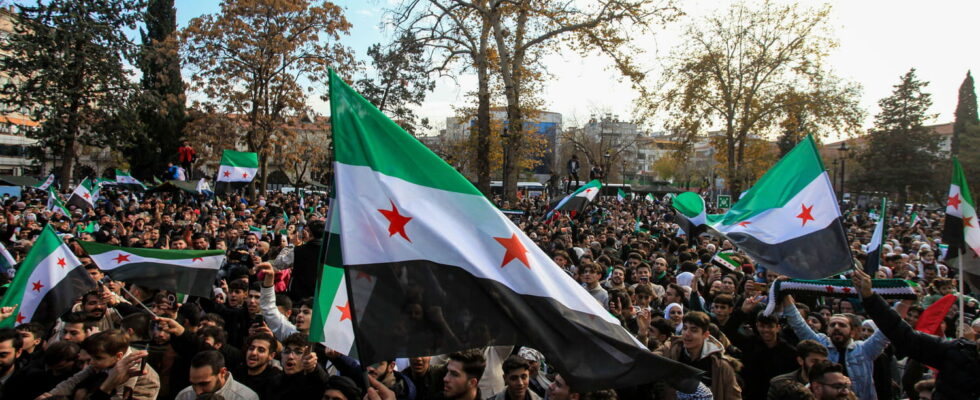Rebel forces led by the Islamist group HTS overthrew the regime of Bashar Al-Assad in Syria and took control of Damascus. Their leader says he is waiting for an official handover, but risks establishing himself permanently at the head of the country.
The regime of Bashar Al-Assad has fallen. The jubilation of Syrians around the world was expressed. But what awaits Syria after the fall of the dictator? Islamist rebel forces, led by the Hayat Tahrir al-Sham (HTS) group, or Levant Liberation Organization in French, took control of part of the country and then of Damascus, the capital, on the night of September 7. December 8, 2024.
The HTS rebels, along with their leader Ahmed al-Chareh, who until recently called himself Abu Mohammad al-Jolani, took possession of the Syrian presidential palace in Damascus. “This victory, my brothers, is a triumph for the entire Islamic community, […] for the region”, declared the HTS leader on Sunday evening from the famous Umayyad Mosque, ensuring that “Syria is purified”.
Although the HTS regained control of Damascus, it did not regain control of the institutions which remained under the control of Prime Minister Mohamed al-Jalali. A deliberate choice by Ahmed al-Chareh who claims to want an “official handover” after the fall of the dictatorial regime. The Syrian Prime Minister also said he was ready, from Sunday, to work on a handover and to cooperate with “any leadership that the Syrian people choose”.
The hope of free elections, the threat of instability
It remains to be seen who the Syrians will turn to and what the rebels who have regained power will do. “The Syrian people must now take their destiny into their own hands,” said the resigning Minister of Foreign Affairs, Jean-Noël Barrot, on Franceinfo. A possible takeover thanks to free and democratic elections, but will these take place? This is what many Syrians hope for, especially those exiled in neighboring countries, in Europe and elsewhere. The resigning minister added that France will support “a political transition which is respectful of human rights, women’s rights and which allows Syria to embark on the path to a just peace and a lasting peace. Because “there are significant risks awaiting Syria, that of fragmentation and instability”. In addition to the HTS which marched on Damascus, other groups participated in the uprising: those of the Free Syrian Army in the south and those from Arab tribes in the west.
The United States shares the French position. US President Joe Biden welcomed the fall of Bashar Al-Assad’s regime on Sunday evening, but recalled the “history of terrorism” of certain rebel groups who brought down the dictatorship. A direct reference to the head of HTS, Ahmed al-Chareh, who has a past as a jihadist and rubbed shoulders with the leader of the Islamic State as well as Al-Qaeda before moving away. American authorities also fear an attempt by ISIS to “reestablish itself” in Syria during the period of transition and instability.
An Islamist regime in Syria? The strategy of the head of the HTS
The leader of the rebel group tries to moderate his image and presents himself as a political alternative. He has swapped the turban and the Islamist dress code for a khaki uniform and no longer wants to be called by his nom de guerre. As soon as Aleppo was taken by the HTS on November 27, Ahmed al-Chareh gave a speech aimed at reassuring the civilian populations, reports RFI : “No one has the right to erase any group. The different communities have coexisted in this region for hundreds of years and no one has the right to eliminate them. There must be a legal framework that protects and which ensures the rights of everyone. Not a system which serves a single community, like what the Assad regime did.
According to several specialists, the leader of HTS, who took control of several territories in Syria such as the province of Idlib, in the northwest of the country, is using these experiences to soften his image. On the spot, “he instead appointed a civilian government composed of technocrats and administrators to manage daily life in the territories controlled by the HTS” explains Hasni Abidi, director of the Center for Studies and Research on the Arab and Mediterranean World at the University of Geneva at RFI. Wassim Nasr, journalist for France 24 who met the leader of the Islamist group, recalls the rigorous ideology of the group, but nuance: “They are, for example, less rigorous than the Taliban. Women go to school, women go to university, people smoke in the street, we hear music in shops… So, it’s rigorous and conservative, but it’s not at all the jihad of al-Qaeda or the Islamic State.”
There therefore remains a lot of uncertainty about what could happen in Syria after the fall of Bashar Al-Assad. If Hasni Abidi believes that the HTS could let “certain ministers, or even the current head of government, manage affairs for this transition phase”, others warn against the establishment of a new authoritarian regime. “We must not be fooled,” warns Fabrice Balanche, lecturer at the University of Lyon 2 and specialist in the Middle East on RFI : Ahmed al-Chareh “imposed Islamic totalitarianism on Idlib, physically eliminating thousands of opponents, whether secularists or moderate Islamists like the al-Sham group. So, one should not have many illusions about which could happen in the months following his possible takeover.
